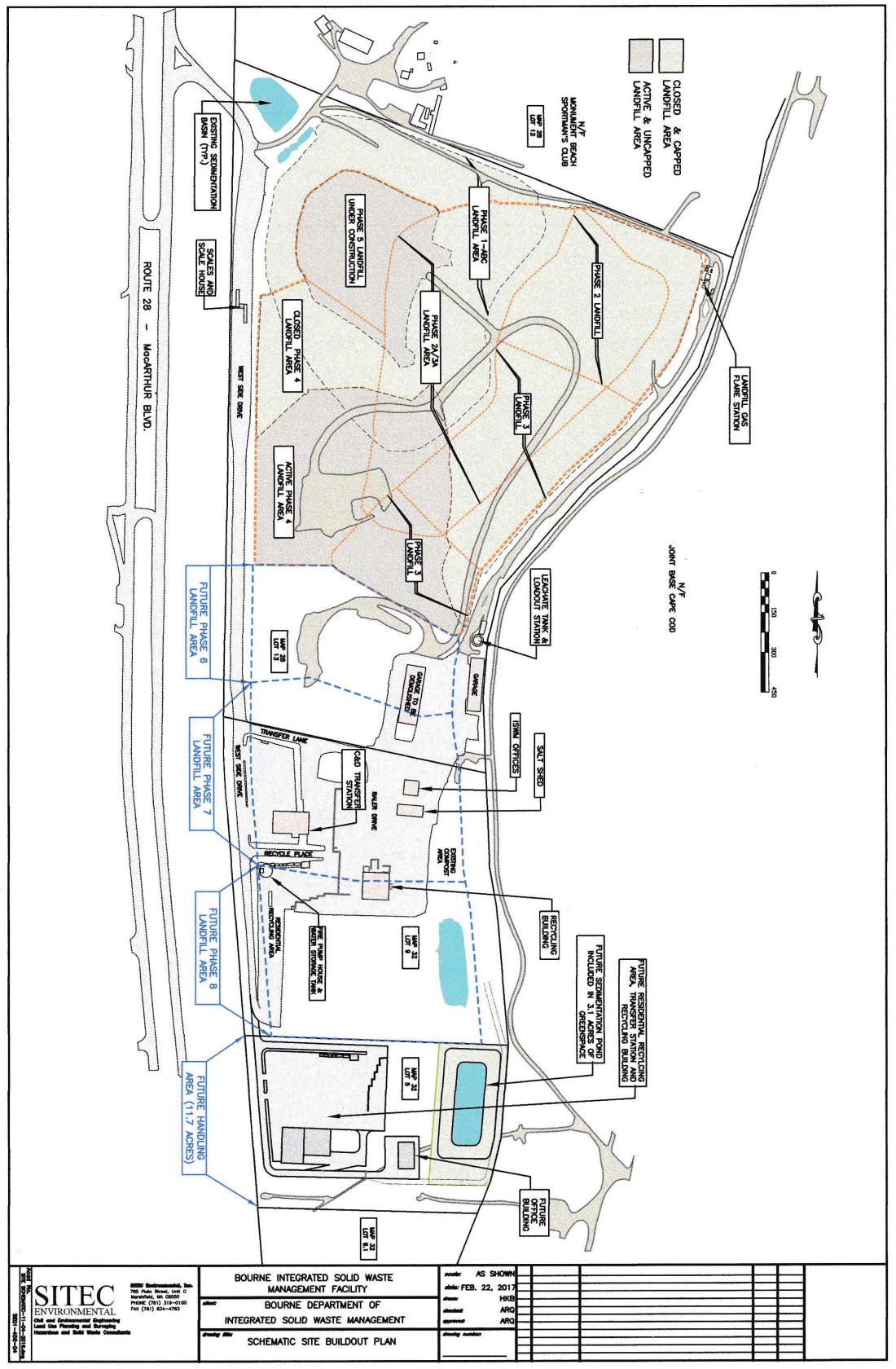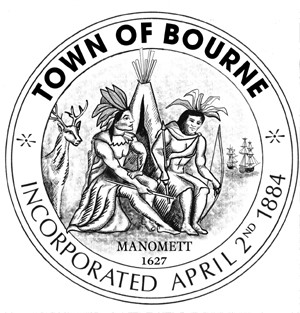Solid waste in Bourne is managed by two departments, the Department of Public Works (DPW) and the Department of Integrated Solid Waste Management (ISWM.). The DPW provides weekly curbside collection of both household trash and mixed single-stream recyclables, using town staff and semi-automated collection vehicles that lift 96-gallon carts provided by and owned by the town.
ISWM was created in 1998 in order to modernize operation of the landfill, generate revenues and meet new State regulations for management of solid waste. Bourne’s 74-acre site was permitted by the State for a regional landfill operation accepting only non-MSW (municipal solid waste), primarily construction and demolition (C&D) debris, with the understanding that the Town would invest in a major C&D processing facility by the end of 2003.
After analyzing market conditions and the changing regulatory situation, however, the Board of Selectmen chose not to construct this facility. Instead, they instructed ISWM to seek permits to allow disposal of MSW and municipal waste combustor ash. Currently the landfill accepts MSW from the Town of Falmouth under contract, MSW from Bourne, and municipal waste combustor ash under contract from the SEMASS waste-to-energy facility in Rochester.
In May 2005, Town Meeting authorized ISWM to spend one million dollars of net assets from the enterprise fund to construct a permanent enclosed C&D transfer station on the abutting 25-acre parcel of town-owned land. This facility has been in operation since 2009.
ISWM is operated as an Enterprise Fund, separate from the tax levy. All operations and debt services for ISWM are paid for by revenue from customers. ISWM also pays for the curbside collection program of the DPW and pays a host fee to the General Fund for every ton it manages.
ISWM manages the landfill, a construction and demolition materials transfer station, a single-stream recyclables transfer station, and a residential recycling center. The residential recycling center manages all of the materials that are collected at the curb as well as yard waste and brush, textiles, scrap metal, construction and demolition materials, electronic waste, tires, white goods such as refrigerators, and items that are diverted from the landfill such as waste oil. ISWM also manages a very popular Swap Shop where useable items can be left for others to take.
Bourne’s recycling program began in 1989 when volunteers set up a drop-off area at the landfill. The following year biweekly curbside recycling began, one of the first such services in south-eastern Massachusetts. A composting program also began in 1989, collecting leaves, grass and Christmas trees. Over the years the program has expanded to include brush and stumps as well. Material for composting is ground up and placed in windrows, where it is converted to compost for use by Bourne residents and is used as a vegetative support layer when closing sections of the landfill that have reached final grade.
Bourne continually looks for ways to improve and expand recycling and composting operations with the most recent major initiative being the distribution of curbside collect carts to all residential properties. Bourne currently has a curbside recycling rate of 30% and is evaluating ways to ensure that quality is the highest it can be.
Waste Management Goal
The Waste Management goal of the Bourne Local Comprehensive Plan
is to continue to maximize recycling and composting of solid waste;
to recycle or compost more than 60 percent of all solid waste by 2030;
and to dispose of the waste that cannot be recycled
in an economical and environmentally sound manner.
Waste Management Policies
• Minimize the amount of solid waste that is generated.
• Maximize the amount of solid waste that is recycled.
• Reduce financial dependency on landfill operations and extend the life of the landfill facility, while assuring that long-term environmental safety remains an overriding concern.
Waste Management Actions
• Plan for long-term sustainable development of the ISWM facility and its integrated approach to solid waste management, including potential operations utilizing innovative technologies that can manage materials beyond the closure of the landfill.
• Monitor developing waste reduction programs and adopt successful models to reduce volumes of waste being generated by residents and businesses.
• Reach out to the business community and multi-family residential developments to encourage compliance with the mandatory recycling bylaw.
• Work with and support the Recycling Committee and the Bourne DPW on ways to expand public space recycling initiatives.
• Educate Bourne residents about the operations of ISWM and improving the quality of single stream recycling through public speaking engagements, site tours, and open houses.
• Work with the Bourne DPW to review and improve curbside collection efficiencies, identify problems and enhance enforcement of the mandatory recycling bylaw.
• Continue the Town’s participation in regional household hazardous waste management collection programs in order to prevent hazardous waste from entering the landfill or otherwise being disposed of improperly.
• Support initiatives at the state level to create a circular economy through programs such as extended producer responsibility
• Continue to explore more economical or efficient options for disposing of non-recyclable wastes in an environmentally sound manner.
• Explore adoption of a toxic and hazardous materials bylaw or regulation based on the Cape Cod Commission’s model.

